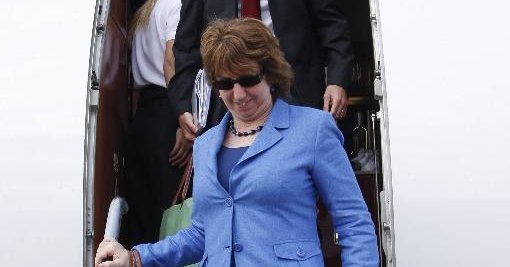Despite her high profile function, Baroness Ashton still lacks a strong presence in the media and is often overshadowed by President of the European Council Herman Van Rompuy and European Commission President José Manuel Barroso. Her harshest critics have questioned her commitment to the role, persistent absence from European Commission meetings and keenness to return home to the UK at the weekend. Member states are also keen for foreign policy to remain a key national competence – a further difficulty for the HR. However, if we look beyond attendance statistics and negative press coverage, the picture is much more complex.
A glance at Baroness Ashton’s agenda reveals that for nearly every weekly commission meeting missed, she was actually away on EU business. This has been an important year for EU foreign policy and the turmoil caused by the Arab Spring has contributed to a full agenda.
For a number of the missed meetings, Baroness Ashton was in the Middle East. She has visited Egypt, Libya and Tunisia among other places in the region. She also met with ministers from Hungary and Poland during their respective presidencies of the Council of the EU.
The justifications for missing the meetings are clear, but given the small army of private staff at Baroness Ashton’s disposal, why didn’t she send a representative on her behalf? Minutes of the European Commission’s meetings reveal that happened just once in 2011, when Chef de Cabinet James Morrison attended a meeting while Baroness Ashton met with the Polish Foreign Minister and attended an Eastern Partnership meeting on trade.
It has become increasingly clear that Baroness Ashton has an impossible job with too many different ‘hats.’ She is the High Representative of the Union for Foreign Affairs and Security Policy, the First Vice President of the European Commission, the UK’s Commissioner, President of the Foreign Affairs Council, a peer in Britain’s House of Lords and the head of the European External Action Service (EEAS). How can one individual completely fulfil all of these obligations and commitments? Now, almost two years on from the treaty of Lisbon’s enforcement it seems that the EU’s vision of a Foreign Affairs supremo who could undertake all of these roles at once was misguided. Baroness Ashton is just two years into a five year term and it will be intriguing to see how her role will look in 2014 when a new High Representative will be appointed.
Since her appointment Baroness Ashton has established the EEAS, appeared at most sessions of the monthly Strasbourg plenary, attended countless summits on a diverse range of diplomatic and security issues and has travelled thousands of miles. One of Baroness Ashton’s most notable achievements is the creation of an EU office in Benghazi, Libya this May. Opened with extraordinary speed in a country that has not only been devastated by civil war but still has some EU sanctions in force, the office ‘fosters EU assistance in coordination with Member States and other international organisation.’ This is perhaps the boldest, most tangible sign that the EU’s revamped external action is active, working and committed to providing the support it can in Libya.
On balance, even Baroness Ashton’s fiercest critics may have a difficult time arguing that her appointment has been a complete disaster, but the fact remains that the HR role is simply too complex, with too broader remit for any one individual to fulfil all of its requirements. It would be unfair to label Baroness Ashton a ‘part-time’ foreign minister because she isn’t, and seemingly she is fighting an unwinnable battle in the respect that she literally, physically, cannot be all the things her job needs her to be. The EU needs to think about this in 2014. It would also be easy to overestimate the importance of Baroness Ashton’s presence at the European Commission’s weekly meetings. Most of the Commission’s actual decision-making takes place during administrative processes or in comitology, so although it seems natural that Baroness Ashton should put in an appearance, perhaps an even greater value can be attached to the work carried out in her absence.

1. On 18 October 2011 at 14:34, by Aymeric L. Replying to: Part-time Ashton? Challenges facing the EU’s High Representative
Replying to: Part-time Ashton? Challenges facing the EU’s High Representative
It is perhaps too early to say that this job is mission impossible. We should not forget that Ashton was in no way candidate for this position. She was appointed by leaders of the PES without running for high-representative, we could even say without her own consent, as she was informed while getting off a train on her way to London.
I think we should wait for the next HR/VP to see. If political parties manage to select candidates for the job in an intelligent way, things might change in 2014.
Concerning her achievements, I would include her position on Palestine’s application for UN membership. Ashton took position without waiting for all Europeans to find an unanimous agreement, which would have taken centuries. I find that courageuous.
In any case, the formula of ’double hat’ may be a difficult challenge, but it should be extended to reduce the number of actors and simplify EU governance (> EU president, Eurozone minister).
Finally, what bothers me the most with Ashton is the way we call her. “Baronness Ashton” may be the correct way to address a member of the House of Lords, but it’s not an appropriate way to call a EU leader, who should all be considered as commoners, even in English!
Follow the comments: |
|
